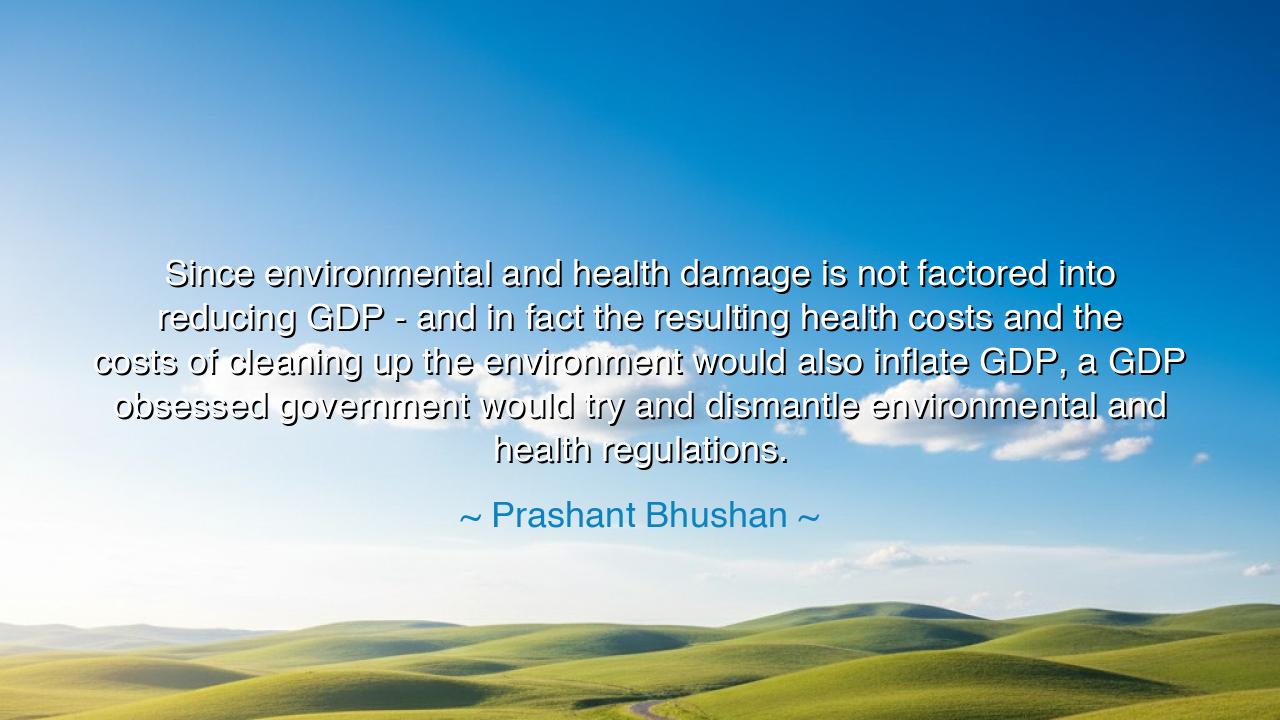
Since environmental and health damage is not factored into
Since environmental and health damage is not factored into reducing GDP - and in fact the resulting health costs and the costs of cleaning up the environment would also inflate GDP, a GDP obsessed government would try and dismantle environmental and health regulations.






In the words of Prashant Bhushan: “Since environmental and health damage is not factored into reducing GDP—and in fact the resulting health costs and the costs of cleaning up the environment would also inflate GDP, a GDP-obsessed government would try and dismantle environmental and health regulations.” These words pierce through the illusions of modern economics, exposing the dangerous trick by which destruction is counted as prosperity. They remind us that a society enthralled by numbers alone may celebrate its own ruin, mistaking disease and pollution for signs of growth.
The ancients knew well that not all wealth is true wealth. Aristotle himself distinguished between the natural economy, which sustains life, and the artificial pursuit of riches for their own sake, which he deemed endless and corrupting. Bhushan’s warning reveals that when governments worship GDP as the sole measure of progress, they forget that poisoned rivers, polluted skies, and sickened bodies are not prosperity but decay. Yet, because the cost of healing and rebuilding is added to the tally of GDP, destruction masquerades as growth, and short-sighted leaders rejoice in illusions.
Consider the tale of the Cuyahoga River in Ohio, which by the mid-20th century had become so polluted with industrial waste that it caught fire not once, but many times. Each fire demanded cleanup, repairs, and medical costs—activities that swelled the GDP figures. Yet could anyone call this prosperity? The people could not drink the water, fish could not live in it, and the land was blighted. Here is Bhushan’s truth illustrated: the cost of healing man-made wounds inflated economic statistics, but the true wealth of clean water and healthy communities had been lost.
So too in Bhopal, India, where a gas leak in 1984 killed thousands and left generations poisoned. The medical treatments, lawsuits, and economic activity that followed added to the tally of money changing hands, yet the suffering of the people was immeasurable. A GDP-obsessed government might point to growth in spending, but the deeper reality was devastation. This is the blindness Bhushan warns against: when the measure of wealth rewards catastrophe instead of preventing it, rulers are tempted to weaken health and environmental regulations, for they see not lives destroyed but numbers rising.
The deeper meaning of the quote is that we must not confuse the map for the territory, nor the measure for the reality. GDP is a tool, a rough marker of activity, but it does not tell us whether that activity builds life or destroys it. A society that prizes growth above all may grow in numbers but shrink in spirit, health, and sustainability. True progress must be measured not only in money but in the flourishing of the land, the well-being of the people, and the harmony of human endeavor with nature.
History reminds us that civilizations which failed to respect this balance collapsed. The Mesopotamians over-irrigated their lands until the soil turned to salt; the Easter Islanders felled their forests until none remained. These societies may have once counted themselves prosperous, but they mistook the plundering of nature for wealth, until nature exacted her due. A people who measure wrongly cannot endure, for they march blind into decline.
So let this teaching endure: do not worship false idols of progress. Question numbers that mask destruction as success. Demand that your leaders measure what truly matters: clean air, safe water, healthy bodies, and the preservation of the earth for generations yet unborn. In your own life, remember that not all gain is growth, and not all activity is prosperity. For the ancients taught, and Bhushan reminds us still: the true wealth of a people lies not in the coins of their treasuries, but in the strength of their bodies, the purity of their earth, and the justice of their laws.






AAdministratorAdministrator
Welcome, honored guests. Please leave a comment, we will respond soon